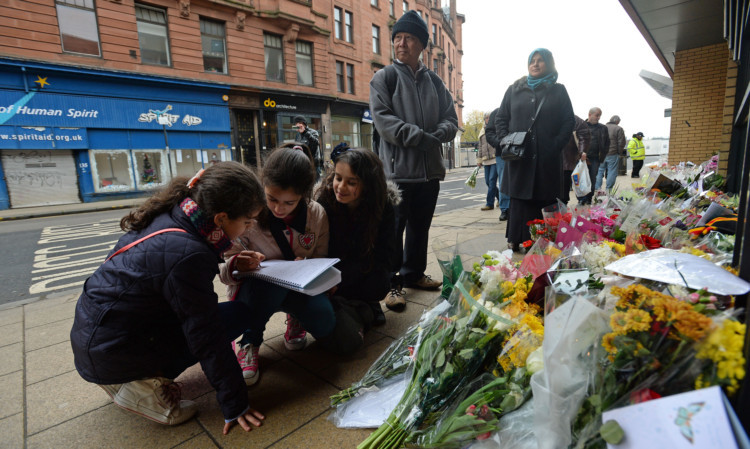The Deputy Prime Minister and Scotland’s First Minister have praised the solidarity and community spirit shown by Glasgow in the days following the helicopter crash which killed nine people.
Both Nick Clegg and Alex Salmond signed a book of condolence at Glasgow City Chambers, while Mr Clegg also visited the site of the crash at the Clutha bar, and met emergency service workers and members of the community.
More than 100 people were in the bar on Friday night when the helicopter dropped out of the sky “like a stone”, crashing through the roof of the bar.
After laying flowers at the nearby memorial site, the Deputy Prime Minister said: “The city is united in sadness and grief but also united in very heartfelt sympathy for those affected by the terrible events on Friday night, and also united in unequivocal support for the exceptional job done by the emergency services who have worked tirelessly in very difficult circumstances, and have also had to mourn, or are mourning, the loss of their friends and colleagues.
“A city which has had its fair share of divisions over time has actually come together in a remarkable way. That has shone through to the rest of the country, which is one of the many reasons why I wanted to pay this visit and come here today.”
Nine people, including three on board the helicopter, died and have all been identified.
Robert Jenkins, 61, and Mark O’Prey, 44, both from East Kilbride in South Lanarkshire; 33-year-old Colin Gibson, of Ayr, South Ayrshire; and John McGarrigle, 57, from Cumbernauld in North Lanarkshire, were named early this morning.
Two other victims killed inside the pub had earlier been named as 48-year-old Gary Arthur, from Paisley, and Samuel McGhee, 56, of Glasgow.
All three of the helicopter’s crew died as it returned from a police operation at 10.25pm on Friday. They were pilot David Traill, 51, and officers Kirsty Nelis, 36, and Tony Collins, 43.
Eleven people remain in hospitals across the city.
The wreckage of the three-tonne Eurocopter was removed from the building yesterday, which allowed emergency services to search the area inside the pub.
The site is still subject to a police investigation but management of the incident scene has been handed over to the city council.
Air accident investigators have said the helicopter pilot made no mayday call and no black box data recorder was on board.
Mr Clegg advised against speculating on what caused the crash or on wider helicopter safety until the full investigation has been carried out.
He said: “Until we know what happened to that particular helicopter on that particular day at that particular time, it is extremely difficult to make wider judgments about what reviews might be necessary.
“No one should have a closed mind when it comes to public safety and, indeed, the safety of emergency services.
“As much as I understand people’s wish to push ahead and come to this conclusion or that conclusion, we just have to now let the investigators do their job.”
Meanwhile, speaking after signing the book of condolence, Mr Salmond said: “I had a look at some of the messages when I was able to sign the book today and people are expressing sympathy, condolence obviously, as you would expect, but also solidarity.
“The theme running through the messages is one of solidarity. The citizens of Glasgow grouping round those who have suffered loss or injury and showing that they care, and the people of Scotland grouping round the citizens of Glasgow – it’s solidarity that runs through the book of condolence.
“Both in terms of the citizens, the ordinary people of Glasgow, and in terms of the work of the emergency services over these last few appalling days, that response has been terrific.”
More than 650 people, including survivors, children and students, have signed the book.
Mr Salmond said an interim report on the incident from the Air Accidents Investigation Branch (AAIB) could be ready within a week but the final report may take many months.
David Goodhew, assistant chief officer with the Scottish Fire and Rescue Service, was also at Glasgow City Chambers.
Speaking of the crash, he said: “It’s been a very difficult and delicate operation throughout.
“I think the fact that there were so many people trapped in the building, it was harrowing in lots of ways for the emergency services, searching for emergency service colleagues as well but the fire crews, ambulance crews, police crews and everybody concerned worked seamlessly for a single aim, in order to resolve the incident as soon as possible and rescue people that could be rescued and recover people that unfortunately had perished in the incident.
“In many ways, you would think the emergency services were working as one.”
